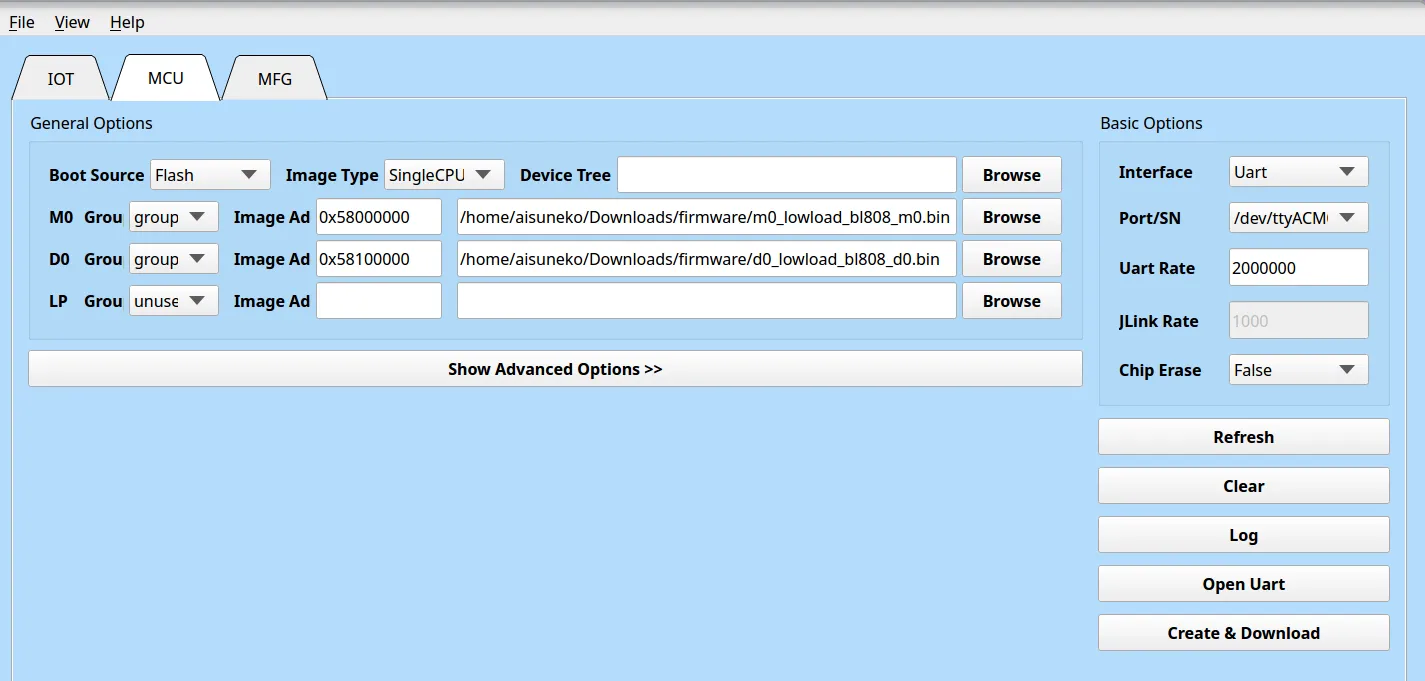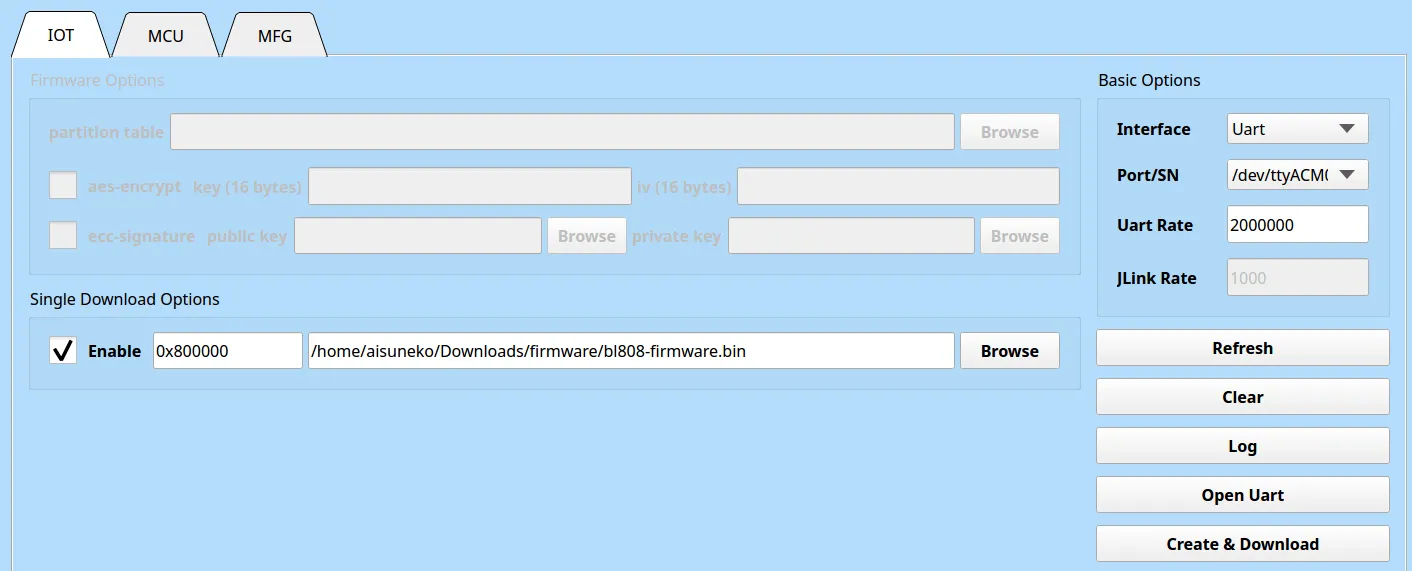System Version
Status
BASIC
Last Update
2025-05-12
BuildRoot Pine64 Ox64 Test Report
Test Environment
Operating System Information
- BuildRoot
Hardware Information
- Pine64 Ox64
- A Type-C or microUSB cable
- A UART debugger (CH340G preferred, avoid CP2102)
- A microSD card
- A microSD card reader
Installation Steps
Get the Image
Download and extract the precompiled image and firmware:
wget https://github.com/openbouffalo/buildroot_bouffalo/releases/download/v1.0.1/bl808-linux-pine64_ox64_full_defconfig.tar.gz
tar -xvf bl808-linux-pine64_ox64_full_defconfig.tar.gz
cd bl808-linux-pine64_ox64_full_defconfig/firmware
xz -d sdcard-pine64_ox64_full_defconfig.img.xzFlashing the Firmware via UART
Power on the board through either the microUSB or Type-C port while holding down the BOOT button. Connect GPIO ports 14 and 15 to your debugger’s RX and TX, respectively - This is the “Flashing UART”.
Download the flashing tool and use the appropriate version for your system to flash the firmware. Make sure your BLDevCube binary is of version 1.8.3 or lower.
Enter the MCU tab and set the parameters as shown below:
M0: Group: group0, Image Addr: 0x58000000, and choose m0_lowload_bl808_m0.bin from the above archive
D0: Group: group0, Image Addr: 0x58100000, and choose d0_lowload_bl808_d0.bin from the above archive
Choose your UART port correspondingly and set the “Uart Rate” to 2000000.
Click “Create & Download” and wait for it to complete.

Next, Enter the IOT tab and set the parameters as shown below:
Enable “Single Download”, set address to 0x800000 and choose bl808-firmware.bin from the above archive.
Click “Create & Download” and wait for it to complete.

Flash the image to SD card
dd if=sdcard-pine64_ox64_full_defconfig.img of=/dev/your/device status=progressBoot
Insert the SD card, and connect GPIO ports 32 and 31 to your debugger’s RX and TX, respectively - This is the “Serial Console UART”. Remember to set the baud rate to 2000000.
Expected Results
The system should start normally with serial output.
Actual Results
The system started successfully, with serial output.
Boot Information
swapon: /dev/mmcblk0p1: read swap header failed
Resizing Rootfs
CHANGED: partition=3 start=2506786 old: size=1048576 end=3555361 new: size=59827133 end=62333918
Partition Resized
resize2fs 1.46.5 (30-Dec-2021)
Filesystem at /dev/mmcblk0p3 is mounted on /; on-line resizing required
old_desc_blocks = 1, new_desc_blocks = 2
[ 3.120120] EXT4-fs (mmcblk0p3): resizing filesystem from 131072 to 7478391 blocks
[ 3.805460] EXT4-fs (mmcblk0p3): resized filesystem to 7478391
The filesystem on /dev/mmcblk0p3 is now 7478391 (4k) blocks long.
Rootfs Resized
Running mkswap
Setting up swapspace version 1, size = 1024 MiB (1073737728 bytes)
no label, UUID=d4bded1e-1d6b-44f1-a861-45c71d817090
[ 4.139249] Adding 1048572k swap on /dev/mmcblk0p1. Priority:-2 extents:1 across:1048572k SS
Swap Partition Formatted
Starting syslogd: OK
Starting klogd: OK
Running sysctl: OK
Starting mdev... OK
Saving random seed: OK
Starting rpcbind: OK
Starting iptables: OK
Starting network: OK
Starting dhcpcd...
dhcpcd-9.4.1 starting
dhcp_vendor: Invalid argument
forked to background, child pid 131
Starting sntp: sntp 4.2.8p15@1.3728-o Mon Mar 6 10:45:15 UTC 2023 (1)
pool.ntp.org lookup error Temporary failure in name resolution
FAIL
Starting ntpd: OK
Starting dropbear sshd: OK
Welcome to Buildroot
ox64 login: root
Last login: Thu Jan 1 00:00:35 on console
# uname -a
Linux ox64 6.2.0 #1 Mon Mar 6 11:17:27 UTC 2023 riscv64 GNU/Linux
# cat /etc/os-release
NAME=Buildroot
VERSION=2022.11.1
ID=buildroot
VERSION_ID=2022.11.1
PRETTY_NAME="Buildroot 2022.11.1"
#
Test Criteria
Successful: The actual result matches the expected result.
Failed: The actual result does not match the expected result.
Test Conclusion
Test successful.
Source: Support Matrix